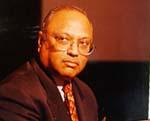|
|
| Help | |
| You are here: Rediff Home » India » Business » Special » Features |
|
| |||||||||||||||||||||||
|
| |||||||||||||||||||||||
It had the ring of something too good to be true: Multinational corporations could alleviate global poverty while boosting their bottom lines. But that was exactly what University of Michigan strategy guru C.K. Prahalad proposed three years ago in his best-selling The Fortune at the Bottom of the Pyramid (Wharton School Publishing).
He spotlighted a largely invisible emerging market--the world's underclass--and called for global companies to kick over their tired notions of the poor as victims and to start treating them as "value-conscious consumers" and "creative entrepreneurs" in their own right.
To some critics, Prahalad's have-it-both-ways proposition is too good to be true.
Aneel Karnani, also of the University of Michigan, argues that the bottom-of-the-pyramid (BOP) market is smaller than Prahalad has claimed--and far less lucrative. Prahalad, however, continues to advance the prospect of an extraordinarily attractive business opportunity that's also an acid test for strategic and technological innovation.
 In an interview with Fast Company, he contended that it's not a matter of whether profitability can overcome poverty, but how fast. Excertps:
In an interview with Fast Company, he contended that it's not a matter of whether profitability can overcome poverty, but how fast. Excertps:
Have you overestimated the size of the BOP market?
The bottom of the pyramid is comprised of 5 billion underserved and unserved people. It is not a monolith--there are many demographic layers within it--and it's not just the poorest of the poor.
But I'm not interested in the pseudo-efficiency of trying to precisely measure poverty. I'm interested in business innovations that will bring the BOP into the market-driven economy.
But if the BOP market is smaller than you say, it obviously will be less attractive to large companies.
The World Resources Institute and the International Finance Corp. just concluded a massive study, and they come up with 4 billion people living on $2 or less a day. In a family of five, that's $3,650 per year. Is that market worth pursuing? I think so.
Can the poor--or even the "underserved"--really be a growth engine for companies?
Look at wireless. In India, wireless-communication companies are adding 5 million new subscribers per month. They expect, by 2010, to have 400 million subscribers connected wirelessly. If you're Nokia, or Motorola, or Ericsson, and you don't participate in that market, 50% of your future business is gone.
If the BOP is as potentially lucrative as you've described it, why haven't more large companies prospered in this market?
But they have. Taken together, the mobile-phone operators in India have been phenomenally successful, with market caps in the billions of dollars.
Today, every large bank is involved in the $200 billion market in international remittances, where low-income foreign residents in wealthy countries send money back to their home countries. Unilever, Procter & Gamble, BP, Philips -- they're all pursuing the BOP, they're just being quiet about it. We're still in the early stages.
If tapping into the BOP is basically about business-model innovation, what's a recent innovation that has really impressed you?
It comes from a company that few would've expected to go after this market: Microsoft. It's experimenting in India with a program called FlexGo, where you prepay for a fully loaded PC.
When the payment runs out, the PC shuts down, and you prepay again to restart it. It's a pay-as-you-go model for people with volatile wages who need, in effect, to finance the purchase.
How does thinking of the poor as consumers help alleviate poverty?
Because consumption can and does increase income. Consider health care. If you are legally blind with cataracts, you can't work and neither can the family member who cares for you.
But if you get access to inexpensive cataract surgery, now you can see and both of you can work. Have you consumed eye surgery or increased the family's earning power? You've done both. It's two sides to the same coin.
More Specials|
|
| © 2007 Rediff.com India Limited. All Rights Reserved. Disclaimer | Feedback |